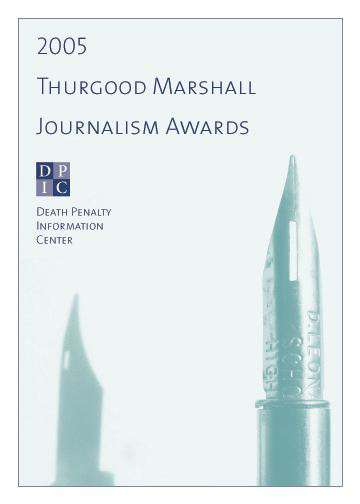
The Death Penalty Information Center (DPIC) will honor journalists from The Birmingham News and The Chicago Tribune, and directors from Big Mouth Productions during its 9th Annual Thurgood Marshall Journalism Awards at the National Press Club on Monday, July 25. The awards recognize those journalists who have made an exceptional contribution to the understanding of problems associated with capital punishment.
This year’s ceremony will feature the first-ever Thurgood Marshall Journalism Award for Excellence in the Posthumous Exploration of Innocence. The honor will go to Chicago Tribune reporters Steve Mills and Maurice Possley for their article about the capital conviction of Cameron Todd Willingham, who was executed in Texas last year. Willingham had been convicted and sentenced to death for the arson murder of his three daughters, but had maintained his innocence since his arrest. An investigation of the state’s case against Willingham revealed that his conviction was based primarily on arson theories that have since been repudiated by scientific advances.
The Award for Excellence in Print Journalism will be awarded to Carla Crowder, a reporter with The Birmingham News. Crowder will receive the honor for her achievements in giving voice to both sides of the death penalty debate in Alabama. Crowder’s articles have profiled the individual life histories of the executed, the economic and personal struggles faced by those who have been exonerated from death row, and the stories of those who continue to await their executions. In 2004, Crowder wrote about the life of David Hocker, who was executed in Alabama late last year. Hocker was convicted of capital murder after a one-day trial, sentenced to death after his attorney presented no mitigation evidence, and was executed with no post-conviction review. In her series on Hocker, Crowder did what no attorney or social worker had ever done before: tell Kevin Hocker’s life story.
Directors Katy Chevigny and Kirsten Johnson of the New York-based Big Mouth Productions will receive the Award for Excellence in Broadcast Journalism for their documentary “Deadline.” This film, which was featured last year by Dateline NBC, gave viewers a first-hand look at the emotional events surrounding former Illinois Governor George Ryan’s historic decision to pardon four men and offer clemency to the remaining 167 people on the state’s death row due to his concerns about the fairness and accuracy of Illinois’s death penalty. Though he had been a tough-on-crime death penalty supporter for nearly two decades, Ryan’s opinion about capital punishment was shaken when he watched a group of journalism students discover evidence that exonerated a man from death row just before his scheduled execution. In the film, Chevigny and Johnson give viewers an insider’s look at Ryan’s courageous actions and America’s death penalty debate.
New York Assemblyman Joseph Lentol will deliver the keynote address at the awards luncheon. Earlier this year, Lentol, who is Chair of the Assembly’s Committee on Codes, played a pivotal role in the committee’s historic vote not to reinstate capital punishment in New York. A former death penalty proponent, Lentol’s position on the issue began to evolve after the state’s statute was declared unconstitutional in 2004 and the Assembly held a series of public hearings to determine the best course of action regarding the future of capital punishment in New York.
The Thurgood Marshall Journalism Awards are named in honor of the late Supreme Court Justice who believed that people would see the death penalty in a new light once they understood how it works in practice. “The question with which we must deal,” Justice Marshall wrote, “is not whether a substantial proportion of American citizens would today, if polled, opine that capital punishment is barbarously cruel, but whether they would find it to be so in light of all information presently available.”
The distinguished judges for this year’s Awards were Loren Ghiglione, Dean of the Medill School of Journalism at Northwestern University, and Virginia Sloan, Executive Director of The Constitution Project.
Entries for next year’s awards must be published or produced in 2005 and should be submitted to the Death Penalty Information Center by January 31, 2006.
See Thurgood Marshall Journalism Awards.